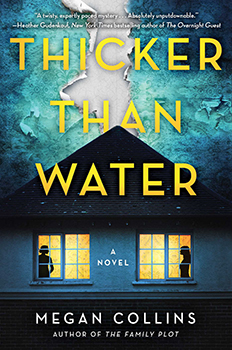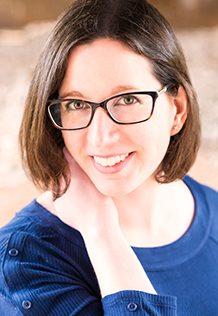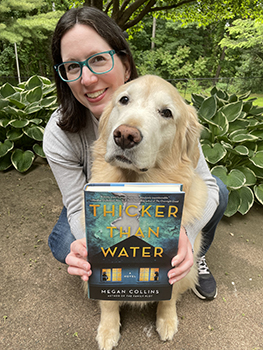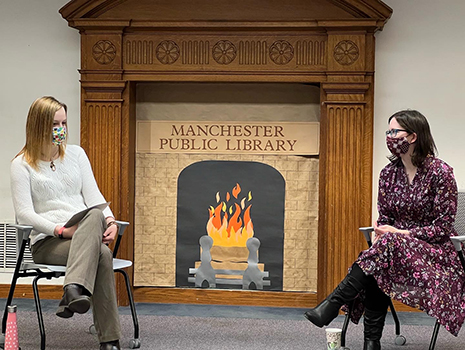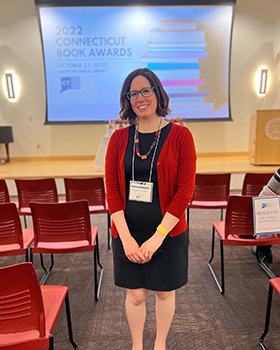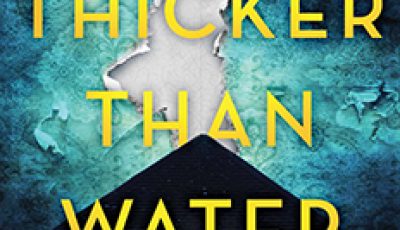

Features Megan Collins
Family Treason
It all began with a tweet.
Megan Collins—the mistress of dysfunctional family fiction—was hard at work on her fourth suspense novel (following 2021’s The Family Plot) when, while scrolling through her Twitter feed, she happened upon a term that demanded attention: “sisters-in-law thriller.” And, just like that, a new idea took hold—two women connected by the man they both love, whose seemingly indestructible bond threatens to break under the weight of secrets and suspicions.
In THICKER THAN WATER, Julia and Sienna aren’t just sisters-in-law—they’re best friends and business partners. But when Jason—husband and brother, respectively—is named a person of interest in the grisly murder of his boss (who was stabbed, suffocated, and…stitched), subtle doubts become substantial fissures. Further complicating matters is the fact that Jason has been rendered comatose as the result of an accident and can’t offer up a defense or explain away the evidence that incriminates him. What consequences will he wake up to, assuming he wakes up at all?
Here, Megan Collins talks to The Big Thrill about the many nuances of her new thriller, how doing a complete rewrite helped to bring them into sharper focus, and the ways in which her background as a poet and teacher inform her approach to craft.
THICKER THAN WATER centers on the relationship between sisters-in-law (and BFFs) Julia and Sienna, whose friendship/business partnership is tested when the man that bonds them, Jason, becomes a murder suspect (and while in a coma, no less!). What compelled you to explore this particular dynamic—and how does the extraordinary nature of the circumstances create cracks in what appeared to be an unbreakable bond?
The origin of the core relationship between Julia and Sienna actually came from something my agent, Sharon Pelletier, said. She mentioned in a tweet one day that she was dying to read a “sisters-in-law thriller.” I was deep in the trenches of a different book at the time, but I couldn’t stop thinking of what a “sisters-in-law thriller” would look like. Of course, with my twisted brain, I went an immediately dark route: two sisters-in-law are perpetually at each other’s throats—and each try to sabotage the other’s relationship with the man who connects them, until that man is murdered. Both women become prime suspects who must work together to clear their names.
When it came time for me to start pitching my next book, I thought it would be a bigger challenge as a writer to begin from a place of light—well, more light, anyway. My go-to move is always to center a deeply dysfunctional family in my books, but what if, instead, I began with a family who believes they are perfectly functional until something happens that shows the darkness lingering beneath the surface the entire time? That’s why, in the book I ended up writing, Sienna and Julia are best friends. They believe that nothing can come between them, that theirs is a uniquely perfect bond. And by making the man who connects them, Jason, the main suspect of a brutal murder, I was able to nudge a wedge between these women. At first, they work together to clear his name, but the more they uncover, the more one of them is no longer sure he’s innocent. And since Julia and Sienna’s relationship is so intrinsically tied to their shared love of Jason, that threatens their relationship in a way nothing else could, while forcing them to face some secrets they, too, have been keeping.
The narrative alternates POV between Julia and Sienna. How did you go about capturing each character’s personality and voice to render them distinct on the page, and in what ways does this structure work to heighten suspense and uncertainty?
Julia and Sienna actually represent two very different sides of myself. One side (the Julia one) is non-confrontational to a fault and doesn’t always speak up for herself for fear of how others might view her. The other side (the Sienna one) is triggered by injustice, big and small, and will rage about it to anyone who will listen, consequences be damned! Because I felt such a connection to both characters, their voices came pretty naturally to me. Of course, it also helped that I re-wrote this book from start to finish after turning in the initial draft to my editor.
In the first draft, the story was told in third-person and head-hopped between Julia and Sienna, but as I sat down to tackle the rewrite, I saw it could work a lot better if each character got to tell their side of the story in every other chapter, which is how it became a first-person, dual-POV narrative. And because I’d already written an entire draft before I attempted that version, I already knew the characters really well, so their distinct voices were easier to find and develop.
The new structure also helped me with one of the goals I had when I started writing. Because the narrative flips back and forth between Julia and Sienna’s increasingly different takes on Jason as a murder suspect, I wanted the reader to flip back and forth, too. When they’re in Julia’s thoughts, I wanted them to be convinced by Julia’s point of view, and vice versa when they’re in Sienna’s, even if that means contradicting something they just believed in the previous chapter. It’s ultimately up to the reader as to whether I was successful in reaching that goal, but the alternating POV structure definitely helped me to build the plot in a way that would hopefully allow for that constant uncertainty in both the characters and the reader.
One of the story’s themes, or underpinnings, is the idea that trauma can affect people not only profoundly but differently. Tell us about the burdens your characters carry and the ways in which they contribute to their actions (or inactions).
Julia’s trauma stems from her upbringing: her father left when she was just a baby, and her mother carried that wound in very visible and audible ways throughout Julia’s childhood. At one point, when Julia spoke up to try to help her mother, the situation backfired, her mother screaming words so harsh that Julia never forgot them and, in turn, believed that using her voice might only hurt herself or others. That’s why, when we meet Julia as an adult, she keeps a lot of her true feelings to herself, to the point they eat away at her and corrode her relationships, too.
For siblings Sienna and Jason, their trauma is a result of two events: something that happens at a high school party, and the death of their parents at the hands of a drunk driver. In both cases, Sienna sees Jason as rescuing her from her fear and grief—he is a protector, always—which causes her to double down on his innocence, even in the face of disturbing evidence. The loss of her parents, to someone who only served a year and a half in jail, is also the great injustice of her life, and it’s caused her to see injustice everywhere, especially when her seemingly perfect brother is accused of a murder she’s sure he could never commit.
In many ways, Jason seems like the ideal man (brother, husband, friend, etc.)—though, upon closer examination, we see that he is simply…human. What does this reveal about the pitfalls of putting people on pedestals, and how does the discovery of his flaws play into perceptions of his possible guilt?
It’s a dangerous thing, thinking of someone as perfect. It keeps you from seeing their humanity, so when their darker, uglier sides do show (and we all have them), it’s a huge blow not only to your perception of them but to your trust in your own judgment, as well. At the very beginning of the book, before Jason has even been accused of murder, Julia is keeping something from Sienna, something that has already knocked her perception of Jason way off-kilter and made her question her belief in him. So, when evidence arises that connects him to such a brutal crime, she is able to see it a little more clearly than Sienna is—and that soon causes her to drift from Sienna’s firm stance of innocence.
Explain your process in creating the eerie, enigmatic Triple S killer (stab, suffocate, sew)—both as an entity who dominates the local news cycle and one fitting of the suspects you develop throughout the novel.
The murders in this book are particularly brutal because three methods are involved: first, the victim is stabbed, then suffocated, and then, post-mortem, his mouth is stitched shut, his body left in his own backyard. Like most of the murders I write, it also happens in a relatively quiet community, which rattles people even more—and the victim in question is a prominent business owner who seems beloved by customers and employees alike. I wanted the three-tiered method to make the murder feel like literal overkill, showing that this was not a robbery gone wrong or something random like that. It’s deeply personal. In part, that’s what makes Sienna and Julia so sure, initially, that Jason couldn’t have been the killer.
While the victim was his boss, Jason had no close connection to him, no grudge, no feelings about him one way or the other—and certainly, no reason to want to sew his mouth shut. But then the police find his dead boss’s phone in Jason’s car, along with a bloody knife, so either someone had reason to want the boss dead and frame Jason in the process, or Jason’s more involved than Julia and Sienna want to believe.
You have a background in poetry. In what ways has that influenced your approach to prose, both in terms of words themselves and in crafting something that’s “poetic” in terms of big picture balance (or justice)?
Poetry is also about capturing big emotions and distilling them into a small but impactful space, so that’s definitely influenced my approach to storytelling.
I’m obsessed with the cadence and rhythm of words, to the point where I will agonize over a single sentence for an hour before I feel like I’ve gotten it right. I don’t necessarily recommend this—it makes for very slow writing and revising!—but that’s definitely my poetry background at work. I’m always striving to make the prose as interesting as the story itself, because that’s the kind of book I love to read, one where you have to stop to simply admire the language, even when all you want to do is keep turning the pages to learn what happens next.
Poetry is also about capturing big emotions and distilling them into a small but impactful space, so that’s definitely influenced my approach to storytelling. I want my thrillers to be riveting, of course, but I also want the reader to feel something beyond suspense; I want there to be a lump in their throat at certain lines.
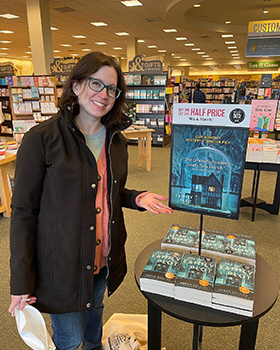
Megan posing with the Barnes & Noble display for The Family Plot, which was their Mystery/Thriller Pick for April 2022
You left your teaching job during the pandemic. In what ways has that changed your relationship with writing and the value which you put on it (assuming it has)—and how do you reconcile your creative impulses with more pragmatic business concerns?
Because I taught creative writing, I don’t know that leaving has changed the value I put on it. Every day, in every classroom, I was reminded of its value as I saw my students work so hard on their craft, on finding their voice, on sharing it with others. Of course, while I was teaching, my writing time had to be worked in around my work schedule—an hour or two here, another hour there—and if I got an idea for my book while I was teaching, I couldn’t immediately jot it down; it always had to wait.
Now, I’m able to write in the way that best works for me, which means starting at around 9:30 a.m., setting a word count goal for the day, and working until I meet it (with breaks for snacks, lunch, and walking my dog Maisy, of course). This is a privilege and luxury for which I’m immensely grateful, but it’s not without a fair amount of stress and anxiety. Since I no longer have teaching as a source of income, I need writing to work (i.e. my books to sell) in a way I didn’t necessarily need before. This puts a lot more pressure on me, but so far, I’ve found that it’s only pushed me creatively. I know I need to sell another book—so I better write one worth buying.
Leave us with a teaser: What comes next?
I’m currently working on my fifth thriller, which is currently titled Cross My Heart and is about a woman who becomes romantically obsessed with the husband of her heart donor, even as rumors swirl that he may have had something to do with his wife’s death. I’m having such a blast writing it, especially since the protagonist has both a heart of gold (no pun intended) and some very bad habits.
John B. Valeri is a book critic, author, and host of the web series “Central Booking” who has written for CrimeReads, Criminal Element, Mystery Scene Magazine, The National Book Review, The New York Journal of Books, The Strand Magazine, and Suspense Magazine. His popular Examiner.com column, “Hartford Books Examiner,” ran from 2009 – 2016 and was praised by James Patterson as “a haven for finding great new books.” Visit him online and watch past episodes of “Central Booking” at JohnBValeri.com.
- The Ballad of the Great Value Boys by Ken Harris - February 15, 2025
- Don’t Look Down by Matthew Becker - February 15, 2025
- The Wolf Tree by Laura McCluskey - February 14, 2025

